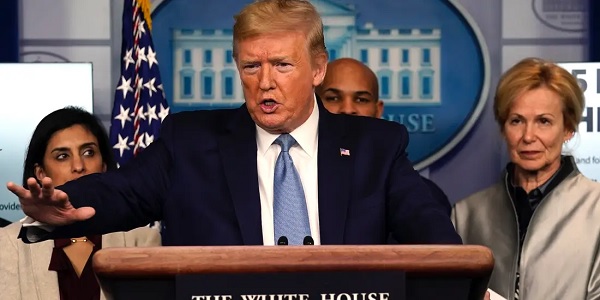
Attorney Scott Pilutik wrestles with the news of the day, from a lawyerly perspective…
[Regarding this story: 34 days of pandemic: Inside Trump’s desperate attempts to reopen America]
This is mostly a recap of the last month or so since Trump agreed to extend social-distancing guidelines. If you’re paying attention there’s nothing especially new, but helpful in identifying a few recurring themes.
First: If you, an uncredentialed hack, manage to get yourself on the White House’s radar with a rosy forecast or magic bullet, Trump will disregard actual expertise in a heartbeat and go with whatever garbage you’re peddling, whether it’s a poll, cure, or chart.
Second: Jared Kushner somehow manages to exceed my worst expectations with every utterance.
“This is a historically new challenge, and we’ve really risen to the occasion. When history looks back on this, they’ll say, man, the federal government acted really quickly and creatively, they threw a lot at the problem and saved a lot of lives.”
History is going to be relentless and brutal for decades.
Third: The “doctors” group — the people with credentials, are at best tolerated, and routinely sidelined.
“There’s a little bit of a God complex,” one senior administration official said of the [doctors] group. “They’re all about science, science, science, which is good, but sometimes there’s a little bit less of a consideration of politics when maybe there should be.”
Fourth: Trump continues to view all of this through an autocratic, narcissistic lens. His only concern appears to be his media coverage and how that coverage might be impacting his re-election chances. He’s always killing the messenger, as if the only problem is everyone not clapping hard enough.
The overriding theme is losses. That they keep gambling with lives and they keep losing, credulously relying on demonstrably unreal worldviews. People are losing their lives and this goes unacknowledged by the White House every day.
And now with federal guidelines lifted, the White House has sent a clear signal to the states that the storm clouds are headed out to sea. There’s no reason to think that’s true. The curve “peaked,” but that was largely due to New York, with its disproportionate number of cases, having peaked. For the rest of the country it’s a plateau.
The most generous view of why they’re pretending this is over is that Trump is basically a degenerate gambler who has managed to get away with all manner of financial criminality in his life.
The less generous view is that they (Trump, the Republican governors, the White House) are really okay with six-figure deaths, and they’re now embarking on a shadow herd immunity policy — the quicker everyone gets it the sooner the Dow can get back to 30,000. So long as the majority of deaths remain, uh, urban, as has been the case, they’re deemed acceptable losses, just as Ronald Reagan was able to preserve his political viability while ignoring 80,000+ AIDS deaths on his watch.
[Regarding this story: How to Vote by Mail in All 50 States]
There’s a lot of talk about Congress enacting a mail-in voting law before this coming election, which may or may not take place amid a pandemic. Given the uncertainty and given the shitshow that was the Wisconsin primary, you’d think mail-in balloting would be a non-partisan no-brainer.
But of course, any such measures are doomed because Republicans will always oppose any law that has the potential to increase voter turnout. Their entire re-election strategy is to make casual voters so disgusted in politics that they don’t participate.
That said, most states already permit no-excuse absentee ballots requests, or better, full mail-in voting. And if you live in one of those states you should take advantage and encourage everyone you know to do likewise, because it’s a surer, safer thing than going to the polls on November 3.
But about 1/3 of the states restrict absentee ballots only to those who can demonstrate a valid excuse, which excuses vary from state to state but are generally unavailable to most voters. Since Congress probably won’t pass a veto-proof national mail-in voting provision, it would help if voters pressured state legislatures in these states.
And here are those states:
Connecticut
Delaware
Massachusetts
New Hampshire
New York
Virginia
Alabama
Arkansas
Mississippi
Tennessee
Louisiana
Kentucky
Indiana
Missouri
South Carolina
Texas
West Virginia






